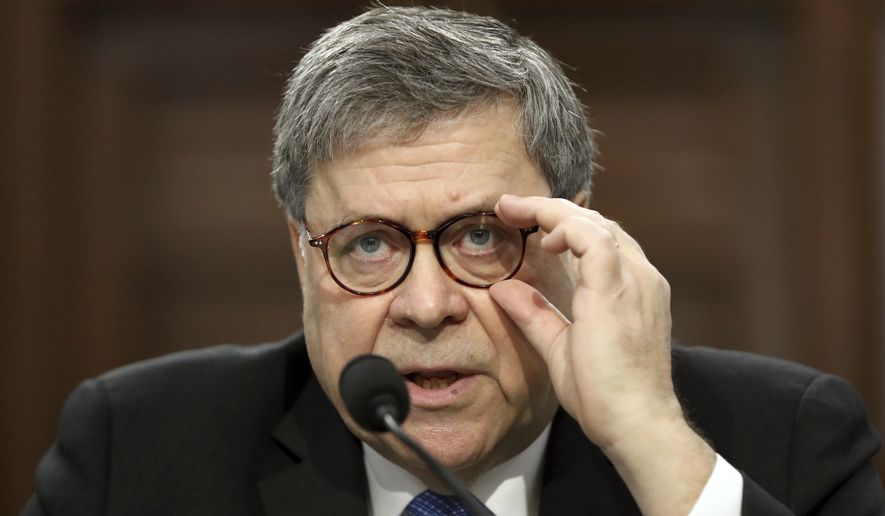Attorney General William P. Barr said Tuesday that he remains on track to release special counsel Robert Mueller’s full report into Russian election meddling within a week, and he bristled at suggestions that he delivered a whitewash of the findings in his original public summary of the nearly 400-page report.
Testifying on Capitol Hill, Mr. Barr confirmed that he is conducting his own review of FBI and Justice Department handling of the secret snooping warrants obtained on a former Trump campaign official using information from the dodgy dossier authored by former British spy Christopher Steele.
That is in addition to an ongoing inspector general’s review of the Foreign Intelligence Surveillance Act, he said.
“More generally, I am reviewing the conduct of the investigation and trying to get my arms around the aspects of the counterintelligence investigation that was conducted in the summer of 2016,” Mr. Barr told lawmakers.
Called to Capitol Hill to talk to a House appropriations subcommittee about his fiscal 2020 budget request, Mr. Barr instead found himself fending off allegations that he mishandled the fallout from Mr. Mueller’s work.
He said the White House wasn’t involved in writing the public summary of the special counsel’s report, and he rejected Democrats’ accusations that he exonerated the president with his initial summary, saying flatly that the finding “does not exonerate” President Trump of obstruction of justice.
He defended the time he is taking to redact the report and said he will conceal grand jury findings, classified information, anything that could sour other ongoing investigations and personal details on “peripheral” people. Mr. Barr said the redactions will be color-coded for the public.
He refused to go beyond those statements in testimony to the committee, whose Democratic members were far more interested in the report compiled by Mr. Mueller than they were in the department’s 2020 budget.
“I’ve said what I’m going to say about the report today,” Mr. Barr said. “I’ve issued three letters about it, and I was to discuss the historic information of how the report came to me and my decision on Sunday, but I’ve already laid out the process that is going forward to release these reports hopefully in a week, and I’m not going to say anything more about it.”
Democrats prodded him nonetheless. They said he has bungled the handling from the start by speeding out a short summary and then delaying the full release for weeks.
House Appropriations Committee Chairwoman Nita M. Lowey, New York Democrat, said the two days Mr. Barr took to digest the report and announce that the president wouldn’t be prosecuted shortchanged the gravity of the situation.
“Even for someone who has done this job before, I would argue it is more suspicious than impressive,” she said of Mr. Barr’s quick turnaround.
Democrats voted last week to subpoena the full report but did not issue any subpoenas.
Congress and the public have seen only a four-page letter authored by Mr. Barr outlining the special counsel’s “principal conclusions.”
The synopsis said Mr. Mueller did not find that anyone in Mr. Trump’s orbit conspired with Russia to sway the 2016 presidential election. The special counsel did not reach a decision on whether the president obstructed the investigation, but Mr. Barr wrote that he and Deputy Attorney General Rod Rosenstein concluded that there wasn’t enough evidence to make such a case.
Mr. Barr said Tuesday that the special counsel kept Mr. Rosenstein abreast of its work and that both men met with Mr. Mueller on March 5 to discuss the investigation’s approaching finish line.
The attorney general said those meetings gave him “an inkling of what was coming in our direction.”
“The thinking of the special counsel was not a mystery to the people at Department of Justice prior to the submission of this report,” Mr. Barr said. “He and his people had been interacting with the deputy attorney general.”
Mr. Barr said the special counsel was offered an opportunity to review his four-page letter but declined.
Responding to Democrats, Mr. Barr said the White House did not review the four-page synopsis, but he refused to answer Ms. Lowey’s questions about whether the White House has seen the report since then.
He also rejected her suggestion that he mischaracterized the findings.
“It is hard to have that discussion without the contents of the report, isn’t it?” He said. “And that’s why I suggest we wait until the report is out.”
Mr. Barr refused to commit on whether the full report, sans redactions, would be released to Congress, but he indicated that he would answer lawmakers’ questions and described the upcoming release as “a first pass.”
When asked whether he would seek a court order to release confidential grand jury material to Congress, Mr. Barr said the call belongs to House Judiciary Chairman Jerrold Nadler, New York Democrat.
Republicans on the committee chided Democrats for their intense focus on the Mueller report rather than the myriad other duties the Justice Department handles.
Rep. Robert B. Aderholt, Alabama Republican, accused his colleagues across the aisle of promoting “grassy knoll” conspiracy theories about what has been shielded in the Mueller report.
As for the FISA review, Mr. Barr said he expects the inspector general to be finished by June, and he is personally reviewing the situation.
Rep. Devin Nunes, California Republican, said Sunday that he was sending eight criminal referrals to the Justice Department regarding the origins of the Russia investigation.
Mr. Nunes has not disclosed whom he will refer for investigation.
Mr. Barr said he would look into the matter but has not seen the referrals.
“Obviously, if there is a predicate for investigation, it will be conducted,” he said.
• Jeff Mordock can be reached at jmordock@washingtontimes.com.




Please read our comment policy before commenting.